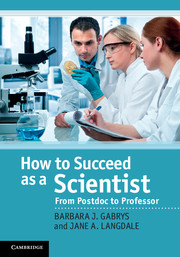Preface
Published online by Cambridge University Press: 05 November 2011
Summary
Preface
This book is based on a series of 20 workshops developed by Jane Langdale in 2005 for postdocs in the Department of Plant Sciences, University of Oxford. The topics were subsequently extended by Barbara Gabrys to cover other disciplines in the Mathematical, Physical and Life Sciences Division at Oxford. The motivation for the workshops and for the book, stemmed from a desire to help postdocs gain a thorough understanding of what being a successful academic entails, and to provide a set of tools to help them achieve that goal. The book can also act as a foundation for others who wish to run their own series of workshops – in each chapter we give an example of how we cover the topic.
We have written the book primarily in the context of the UK higher education sector. However, much of the content is equally applicable elsewhere. The main differences relate to the titles of the various academic jobs in different countries rather than to the expectations of what those jobs entail. Specifically – ‘Lecturer’ in the UK is equivalent to ‘Assistant Professor’ elsewhere; ‘probation’ is equivalent to ‘tenure-track’; and ‘Head of Department’ is equivalent to ‘Chair of Department’ (although Heads normally line manage academic staff whereas Chairs do not). Wherever possible we have used the more universal term Principal Investigator (PI) in order to avoid confusion.
Information
- Type
- Chapter
- Information
- How to Succeed as a ScientistFrom Postdoc to Professor, pp. xiiiPublisher: Cambridge University PressPrint publication year: 2011
